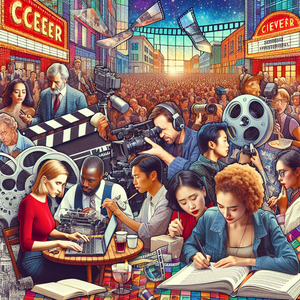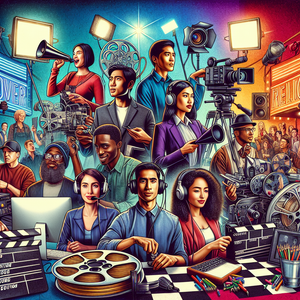
Exploring Diverse Career Paths for Film Graduates: Opportunities Beyond Traditional Filmmaking
The conversation around career opportunities for film graduates is shifting, revealing that a film degree opens doors to a wide array of professions beyond conventional filmmaking roles. While many articles highlight positions like directors and cinematographers, the reality is that the landscape of career options for those who study film has expanded significantly. This evolution emphasizes the demand for skills in storytelling, visual communication, and technical expertise across various sectors, including marketing, education, and digital media production. For film graduates, the potential for diverse and fulfilling career journeys is not just promising but also richly varied, inviting exploration beyond the typical roles associated with film.
Job Summaries:
Film Director:
- Film directors are the visionaries of a project, responsible for guiding the entire creative process from script to screen.
- They collaborate with cinematographers, editors, and producers, often starting in entry-level roles such as assistant director or script supervisor.
- A solid portfolio and industry experience are crucial for success in this role, as directors play a pivotal part in turning written narratives into captivating visual experiences.
Cinematographer:
- Also referred to as the director of photography, cinematographers are tasked with capturing the film’s visual narrative through expert camera work and lighting.
- They work closely with directors to establish the film’s style, requiring a strong foundation in film production and technical skills.
- Their artistry is vital in enhancing the emotional resonance of the story through striking imagery.
Film Editor:
- Editors are essential in post-production, taking raw footage and shaping it into a coherent story.
- They work alongside directors to ensure the film aligns with the original vision.
- This role demands strong analytical skills and familiarity with editing software.
- A degree in film studies or production is typically required, as editors are responsible for creating the final cut that audiences ultimately enjoy.
Production Designer:
- Production designers are responsible for the overall visual concept of a film.
- They oversee everything from set design to props and costumes.
- Collaboration with directors and cinematographers is key to creating a cohesive visual style.
- The visual style reflects the film’s tone.
- A background in film, architecture, or a similar discipline is advantageous.
- A keen eye for detail and creativity is essential.
- Their work significantly shapes audience perception.
Film Publicist:
- Film publicists play a crucial role in promoting films to target audiences.
- They develop and execute promotional strategies.
- They draft press releases.
- They organize interviews.
- They manage promotional events.
- A strong background in film studies, communications, or marketing is essential.
- Excellent writing and interpersonal skills are needed to help elevate a film’s profile and engage viewers.
Media Researcher:
- Media researchers conduct comprehensive research to support film and television projects, ensuring accuracy and cultural relevance.
- They delve into subject matter, audience demographics, and cultural references, providing insights that inform scripts and marketing strategies.
- This role requires strong analytical capabilities and a degree in film studies or a related field, making it vital for authentic storytelling.
Film Critic:
- Film critics analyze and review films, sharing their perspectives across various media platforms.
- This role demands exceptional writing skills, a deep understanding of film theory, and the capacity to articulate nuanced ideas.
- A background in film studies or journalism enhances a critic’s insights, contributing to the cultural conversation around cinema and shaping audience perceptions.
Sound Designer:
- Sound designers craft the auditory elements of a film, including dialogue, sound effects, and background scores.
- They collaborate with directors and editors to ensure sound effectively enhances the narrative and emotional depth.
- A degree in sound design or audio engineering, along with technical expertise in audio software, is essential.
- Sound designers significantly influence the overall viewing experience.
Film Festival Programmer:
- Film festival programmers curate selections for screenings, ensuring a diverse and engaging lineup.
- They assess film submissions, liaise with filmmakers, and often engage in discussions about the films.
- A solid background in film studies, organizational skills, and a passion for cinema are crucial for this role.
- Programmers promote new voices and connect audiences with innovative storytelling.
Digital Content Producer:
- Digital content producers create compelling multimedia content for online platforms, including web series and short films.
- They manage every aspect of production, from scripting to editing.
- This role necessitates a degree in film or media production, along with strong technical skills.
- As the industry shifts towards online content consumption, this role is increasingly vital.
The array of career paths available to film graduates underscores the multifaceted nature of a film degree. Whether one’s interests lie in production, criticism, or research, the opportunities are vast. By exploring various roles and remaining adaptable to industry changes, film graduates can forge rewarding careers in an ever-evolving media environment. With the right blend of skills, passion, and determination, the possibilities are truly endless.
Explore More Jobs

